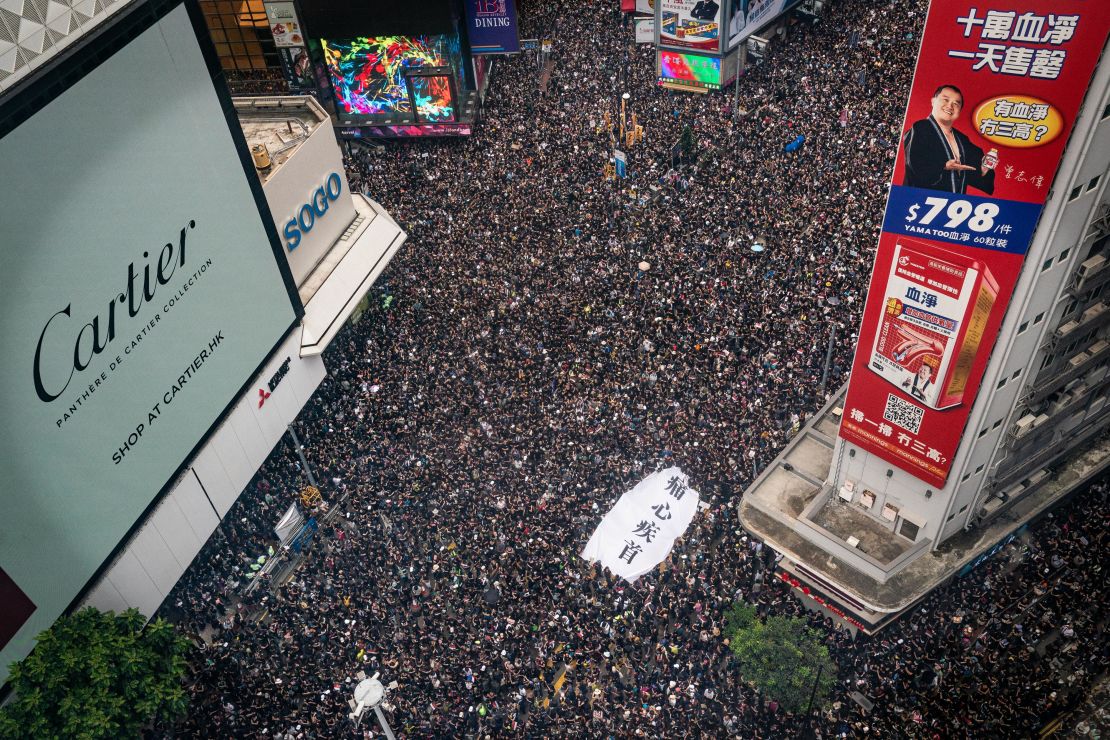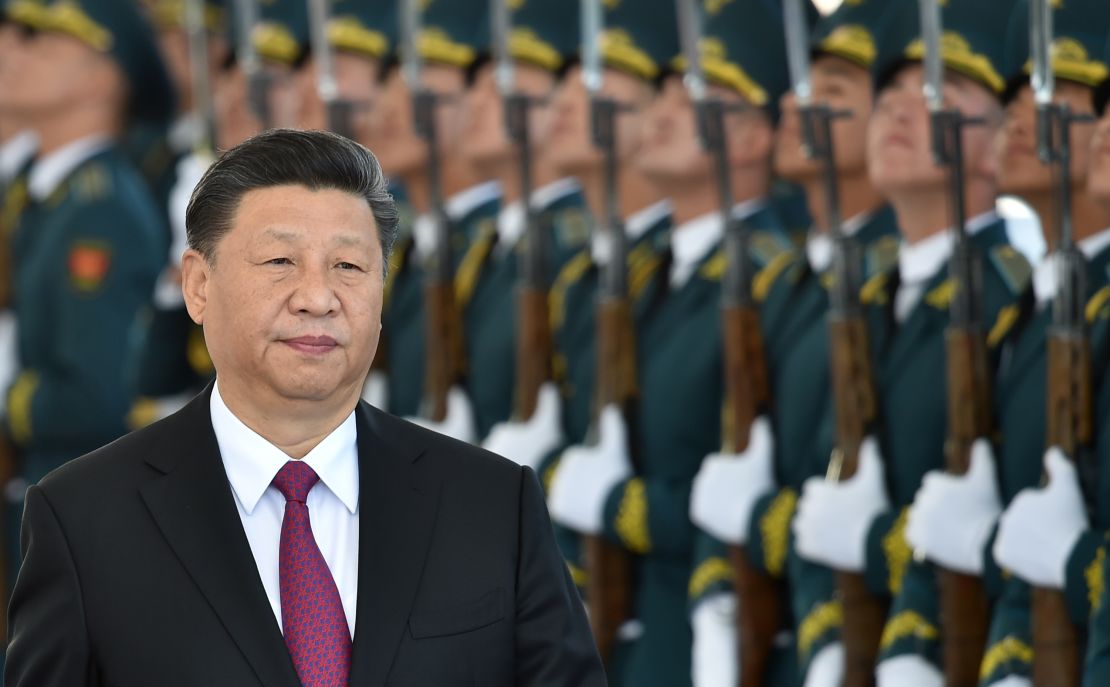Hong Kong has once again burnished its reputation as a thorn in the side of the Chinese Communist Party and its leader, President Xi Jinping, after protesters swarmed the city’s streets for the third time in one week.
Years of relative calm after the 2014 Occupy protests had given the impression that the semi-autonomous Chinese city had fallen into step with Beijing under leader Carrie Lam.
But in just eight days, mass protests have forced the government into a rare public backdown, emboldened anti-China elements in Taiwan and may even become a part of negotiations around the trade war between the United States and China.
US Secretary of State Mike Pompeo said in an interview with Fox News Sunday that he expected President Donald Trump to raise the Hong Kong protests with Xi at the G20 talks in Japan this month.
“I’m sure this will be among the issues that we discuss. We have a wide range of very important issues in the way China and the United States interact,” he said.

Publicly, the Chinese government has struck a defiant tone on the protests, supporting the local government and blaming “foreign meddling” and anti-China elements inside the city.
But experts said the Hong Kong demonstrations drew attention to China at a time when Xi could least afford negative scrutiny.
“President Xi still wants to get the US trade talks back on track and he doesn’t want to link trade with any other issue at this point,” said Bonnie Glaser, director of the China Power Project at the Center for Strategic and International Studies (CSIS).

Xi’s authority ‘dented’
A policy concession by a top Chinese official is rare to say the least, and for it to come as a result of public pressure is almost unheard of.
Nonetheless, that’s what Hong Kong Chief Executive Carrie Lam did on Sunday when she apologized to Hong Kong residents after an estimated 2 million of them, about a quarter of the city’s population, took to the streets.
A day earlier, the government had suspended the controversial bill that protesters said would have potentially put political activists and business people at risk of being extradited to mainland China – and disappeared into the country’s opaque criminal justice system.
Chief Executive Lam and her government have insisted the bill was simply a way to close loopholes and ensure Hong Kong does not become a haven for fugitives from the mainland.
Instead, debate around the law appears to have revived Hong Kong’s nascent protest movement at the worst possible time for Beijing, amid the US trade war and just months before the 70th anniversary of the founding of the People’s Republic of China.
“It implies that if people are brave enough to show defiance against Beijing, they can get away with it, they can get some results, they can force Beijing and the Chinese Communist Party to back down,” said Willy Lam, an adjunct professor at the Chinese University of Hong Kong and longtime analyst of Chinese politics.
Lam said Xi’s authority, already “dented” by the prolonged US trade war, would be further questioned in Beijing in the wake of the Hong Kong protests. “This is one more set back for Xi Jinping,” he said.
Hong Kong divides US and China
Hong Kong is an unwanted headache for the Chinese leader less than two weeks before he is due to meet world leaders at the G20 summit in Osaka.
Most importantly, though it has yet to be confirmed, Xi is also expected to meet face-to-face with US President Trump for the first time since trade talks collapsed at the beginning of May.
Both sides blamed the other for the failure and, in response, the Trump administration raised tariffs to 25% on an estimated $200 billion of Chinese goods.
The Chinese government maintains it is not afraid of a trade war, but higher tariffs are an extra burden on an economy that’s already showing signs of slowing.
While both sides are trying to find a way forward, the Hong Kong protests have sparked another wave of antagonism and rhetoric between the US and China.
After the initial protests, Secretary of State Pompeo expressed concern about the proposed extradition bill, while the US Congress has threatened new legislation which would downgrade Hong Kong’s special status as a trading hub if Beijing doesn’t stop infringing on the city’s freedoms.
That special status is significant. Hong Kong is allowed economic freedoms that are restricted to the rest of China, which, tied with an unbiased court system left over from the UK colonial period, have led to many large Western businesses basing their lucrative China operations out of the city.
As more US businesses begin to look at investments outside of China, Hong Kong’s role as the country’s most economically liberal city is more important than ever.
China’s Ministry of Foreign Affairs said Friday that any attempts to instigate chaos in Hong Kong were bound to fail. “We urge certain people in the US to respect basic facts, discard arrogance and prejudice, stop playing dirty tricks that meddle in Hong Kong affairs,” said spokesman Geng Shuang.
China expert Glaser said it wasn’t unusual for Beijing to accuse the US of interfering in its domestic politics, a standard pattern which went back decades to the fall of the Soviet Union.
But she added it wasn’t out of the question for President Trump to see Hong Kong as a potential point of leverage in trade talks, similar to his handling of Taiwan relations or the export ban on Huawei.
“There’s always a risk that he chooses to use Hong Kong as a bargaining chip,” she said.
‘Over my dead body’
The Hong Kong protests have also come during a heated presidential election campaign in Taiwan, which has increasingly been seen as a referendum on relations with mainland China.
Taiwan and China have been separately governed since the end of a bloody civil war in 1949, and in the past decade Beijing has been attempting to woe the island back through a combination of promises and threats.
President Tsai Ing-wen’s Democratic Progressive Party has historically been seen as pro-independence, while the opposition Kuomintang have encouraged closer relations with the mainland.
But in a sign that the Hong Kong protests are spreading, a leading opposition Kuomintang presidential candidate came out hard on Saturday against closer ties with the mainland.
“‘One Country, Two Systems’ can never be implemented in Taiwan. Taiwanese people can never accept it, unless it’s over my dead body,” presidential candidate Han Kuo-yu told a rally, referring to the special system of government used in Hong Kong.
In response, the crowd chanted “Reject ‘One Country, Two Systems,”’ according to Taiwan news agency CNA.
President Tsai herself has made regular statements in support of the Hong Kong protesters, clearly trying to burnish her anti-Beijing credentials ahead of the January vote.
“In their pursuit of democracy and freedom, the people of Hong Kong (are) not alone. Because we know that if you don’t stand for something, you will fall for anything,” the Taiwan leader said on her official Twitter feed on June 13.
China expert Lam said if the rebellious Hong Kong spirit spread to Taiwan, or even further, it would be dire news of Beijing.
“Xi has been trying to intimidate the people of Taiwan by naked demonstrations of force, but now the Taiwan people can point to Hong Kong to say that if the Taiwan people are united against China, they can get away with it,” said Lam. “They can even force Beijing to make a compromise.”






















